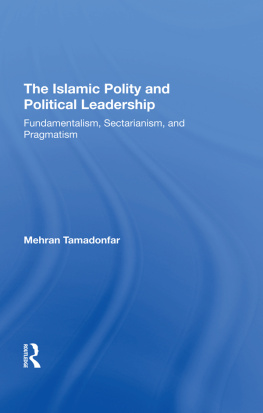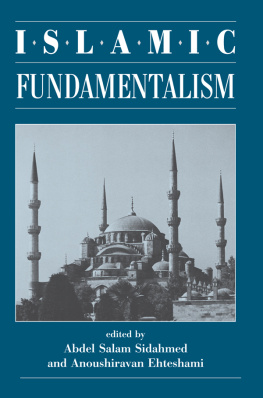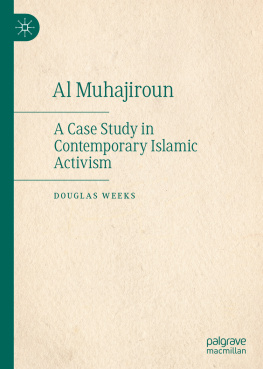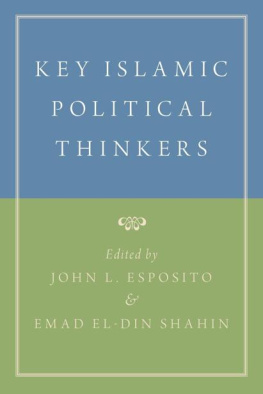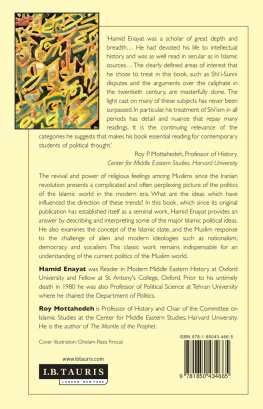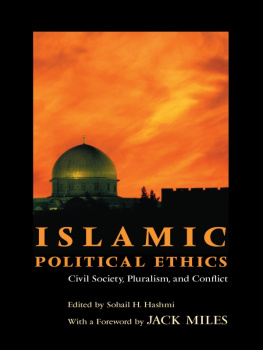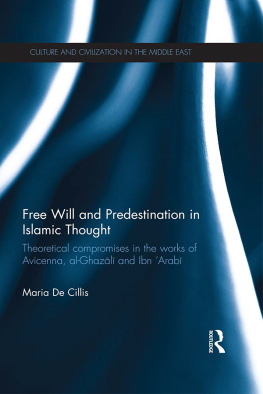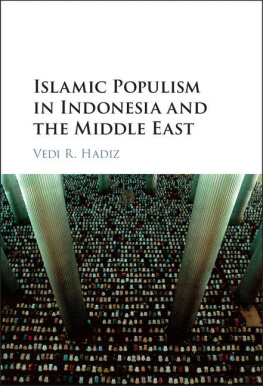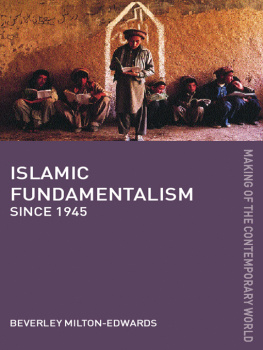The Islamic Polity and Political Leadership
First published 1989 by Westview Press
Published 2019 by Routledge
52 Vanderbilt Avenue, New York, NY 10017
2 Park Square, Milton Park, Abingdon, Oxon OX14 4RN
Routledge is an imprint of the Taylor & Francis Group, an informa business
Copyright 1989 Taylor & Francis
All rights reserved. No part of this book may be reprinted or reproduced or utilised in any form or by any electronic, mechanical, or other means, now known or hereafter invented, including photocopying and recording, or in any information storage or retrieval system, without permission in writing from the publishers.
Notice:
Product or corporate names may be trademarks or registered trademarks, and are used only for identification and explanation without intent to infringe.
Library of Congress Cataloging-in-Publication Data
Tamadonfar, Mehran.
The Islamic polity and political leadership.
(Westview special studies on the Middle East)
Bibliography: p.
Includes index.
1. Islam and State. I. Title. II. Series.
JC49.T35 1989 297.1977 87-10647
ISBN 13: 978-0-367-29326-0 (hbk)
To Diane, Emily and my parents
I am indebted to a number of people for their suggestions and advice during the preparation of this book. Foremost among them is my mentor and friend Professor William Safran who followed the development of this book from its conception to its conclusion. His questions led me to probe deeper; his suggestions invariably improved the manuscript; and his own work and innovative thinking served as an example worthy of emulation. I am also indebted to Professor Richard Pfaff of the University of Colorado and my colleagues and students at the University of Nevada-Las Vegas for their encouragement and patience.
My deepest appreciation goes to Ms. Barbara Ellington and her colleagues at Westview Press for their trust and guidance. Their suggestions for improving the manuscript were invaluable. I am also grateful to Kathleen Martin for her editorial contributions. Last, but certainly not least, I would like to express my gratitude to my wife Diane for her hard work, support and patience.
Needless to say, I am solely responsible for any errors of fact and logic.
Mehran Tamadonfar
In recent decades, the Islamic revivalist movement has played a pivotal role in the socio-economic and political developments of the Muslim Middle East. This role in disestablishing monarchism in Iran and substituting it with an Islamic regime, intensifying conflicts and wars and augmenting violent and non-violent challenges to the established regimes and their leaders, has finally drawn global attention to the Islamic belief system and its impact upon the future developments of the Islamic world.
In the West, the past neglect of Islam was partly due to the lack of understanding of this belief system and its role and partly to Westerners preoccupation with developmentalist frameworks that generally dismissed the vital function religion serves in the development of underdeveloped societies. Today, in the interest of formulating an effective response to the Islamic challenge, the non-Islamic world is, more than ever, interested in Islam and acknowledges its global significance. Thanks to this growing interest, currently the Western reader has an unprecedented access to a wealth of literature on various aspects of Islam. Although recently published materials have been informative and conducive to a much better understanding of the Islamic belief system, they unfortunately contain conceptual, methodological and theoretical shortcomings which inadequately describe the complex issues in Islam. There have yet to be developed frameworks that can comprehensively examine the complex and highly-integrated Islamic belief system. It is my contention that the conceptual, methodological and theoretical frameworks of Western social sciencein their original formsare simply inadequate tools for the study of the issues of the developing world. Nevertheless, a total abandonment of these frameworks seems premature. Until we develop a genuine Third World approach, it is imperative to be open to modified versions of those Western frameworks that can be conducive to a better, though not totally comprehensive, understanding of Third World issues. In this book, such frameworks are employed for the study of the Islamic polity and political leadership.
This book is essentially about leadership in Islam. My interest in leadership studies grew out of the realization that studies of developing systems lack adequate consideration of the leadership phenomenon. At least for methodological, theoretical and ideological reasons, students of developed systems have chosen not to attach much significance to leadership. The preoccupation with behavioralism and pluralism in American political science has focused attention on structural issues and has generally downgraded the role of leadership in the development of Western societies. In view of the fact that leaders have always played a major role in both developed and developing societies, it is imperative to reevaluate our tools and examine the ever-significant leadership factor.
In the first chapter, the reader is introduced to the major conceptual, methodological and theoretical problems and explanations in the study of leadership. It is presumed here that any leadership analysis methodologically requires a synthesis of both organismic and mechanistic models. In this method, leaders are not studied in isolation. They are treated as an integral component of the polity involved in a symbiotic influence relationship with their environment. Thus, the study of leadership entails the study of leaders qualities, their environments and leader-environment interactions.
Two Western theoretical frameworks seem appropriate for the study of Islamic political leadershipnamely, elite theories and theories of charismatic authority. As in elite theories, Islam accepts the unavoidability of social stratification and accounts for leadership as an integral component of the polity. Theories of charismatic authority are applicable to the Islamic polity since they attach a unique significance to the individual attributes of the leaders. In Islam, the primary source of leaders legitimacy is their charismatic qualities that enable them to come to power and lead the community in the divinely-inspired direction. In the first chapter, these theories are examined in some detail.
The second chapter is allocated to the study of the Islamic polity which is the context or environment of leadership in Islam. Here, the Islamic political, economic and social systems as well as policies are studied. In spite of the juridical and sectarian schisms over certain political and theological issues, there is apparently a basic consensus among Muslims about the essential features of the Islamic polity. Classic and modern Muslim thinkers have insisted that a polity is Islamic only if it is founded upon and committed to the implementation of Islamic principles. This proposition raises two fundamental questions: one, has there ever been a complete and genuine Islamic polity in the post-Muhammad era; and two, is such a polity an Islamic utopia that is unattainable? Answers to these questions are neither easy nor are they satisfactory. Historically speaking, many regimesmonarchic and republicanhave claimed to be Islamic and to one degree or another have committed themselves to the implementation of certain Islamic principles. Their opponents have questioned the Islamic nature and thus the legitimacy of these regimes. For instance, many have criticized existing regimes governing Muslim societies, including the Iranian and Pakistani regimes that are officially considered Islamic, for being established on non-Islamic principles and for their insensitivity to the basic premises of Islam. It is evident that despite specific Islamic rulings regarding the polity, in practice the parameters of the Islamic polity is currently defined by power holders, a majority of whom are either not committed to the establishment of an Islamic system or maintain a limited view of what constitutes an Islamic polity.

